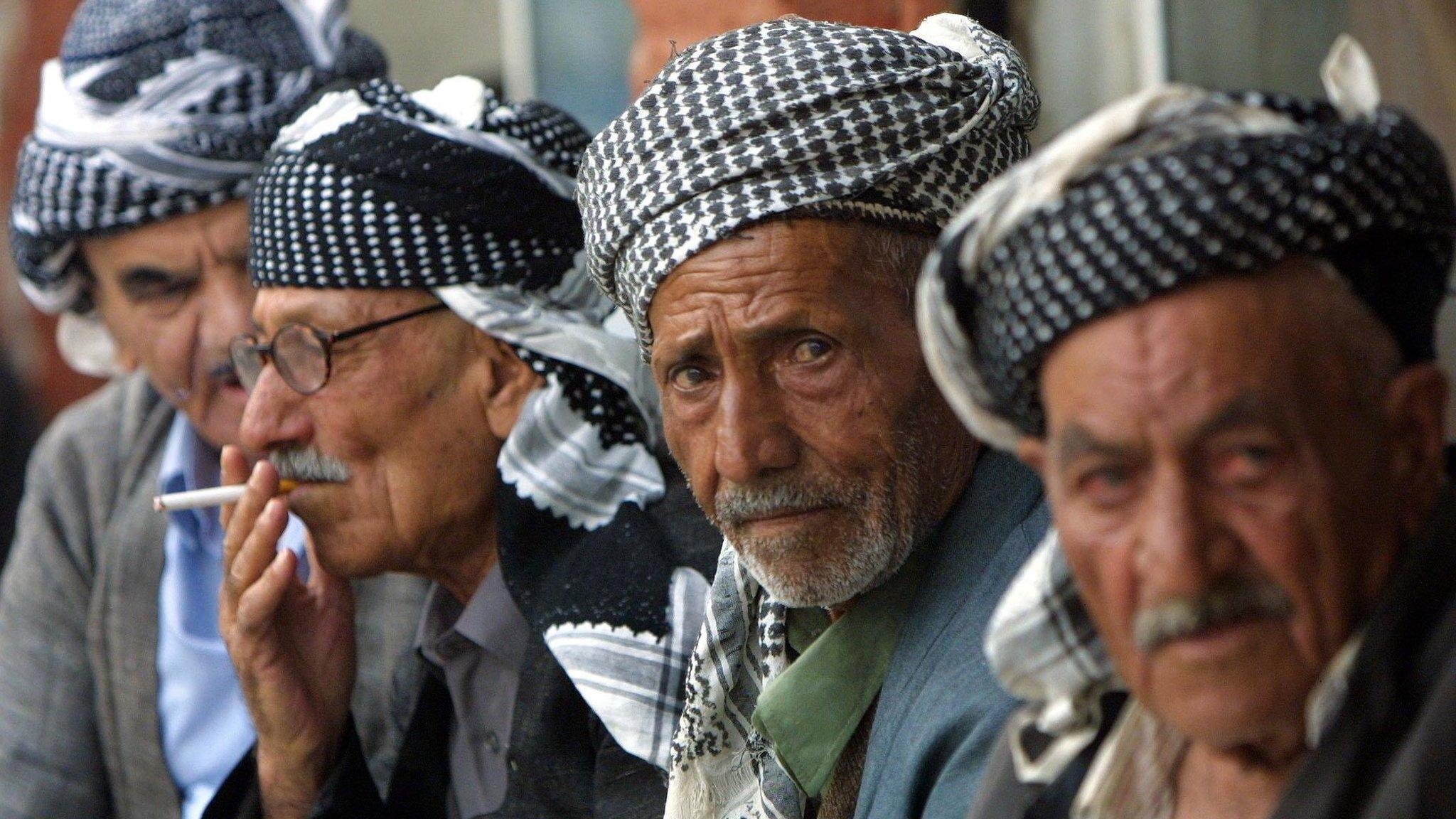Syria war: Turkish-led forces oust Kurdish fighters from heart of Afrin
- Published
Footage shows destroyed statues and flags being raised in the centre of Afrin
Turkish-backed forces have taken full control of the centre of the Syrian-Kurdish city of Afrin.
Fighters waved flags and tore down the statue of a legendary Kurdish figure after claiming the city centre on Sunday.
The two-month Turkish-led operation aimed to rid the border region of a Kurdish militia that Turkey considers a terrorist group.
Activists say 280 civilians have died, although this is denied by Ankara.
Earlier, Turkish President Recep Tayyip Erdogan announced that "units of the Free Syrian Army... took control of the centre of Afrin this morning".
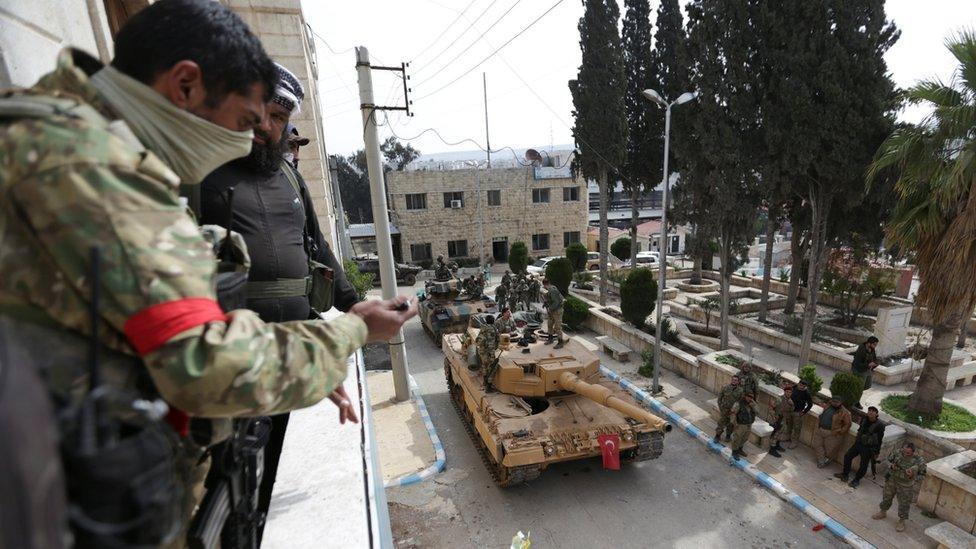
Turkish forces and the Free Syrian Army entered Afrin on Sunday
Operations continued on Sunday to clear mines and remaining Kurdish resistance elsewhere in Afrin.
"Most of the terrorists have already fled with tails between their legs," the Turkish president said.
"In the centre of Afrin, symbols of trust and stability are waving instead of rags of terrorists."
Pictures and video footage emerged of forces tearing down a Kurdish statue with a bulldozer.
The monument depicted the blacksmith Kawa, a legendary figure for Kurds.
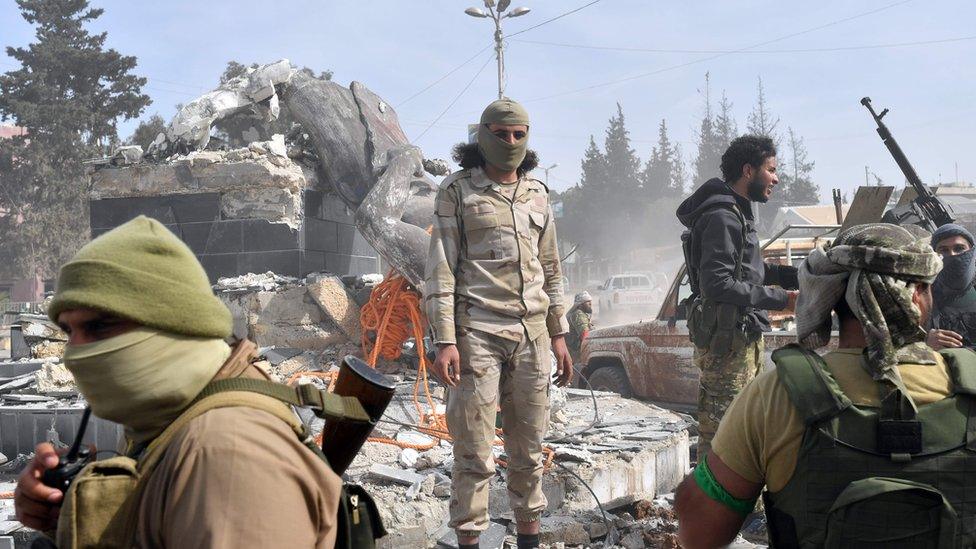
Syrian rebels celebrated after the statue of Kawa was brought down in the centre of Afrin
A statement on a Whatsapp group for the Kurdish-dominated Syrian Democratic Forces called it the "first blatant violation of Kurdish people's culture and history since the takeover of Afrin".
A Turkish armed forces Twitter page posted a video of troops displaying the nation's flag in Afrin's centre.
Allow X content?
This article contains content provided by X. We ask for your permission before anything is loaded, as they may be using cookies and other technologies. You may want to read X’s cookie policy, external and privacy policy, external before accepting. To view this content choose ‘accept and continue’.
Mohammad al-Hamadeen, spokesman for the Turkish-backed Free Syrian Army (FSA), said they met no resistance as they entered Afrin on three fronts.
"Maybe it will be cleared by the end of the day - it is empty of [YPG] fighters, they cleared out," he said.
Turkish military spokesman Bekir Bozdag said the campaign would continue until the area around Afrin was secure.
A short guide to the Syrian civil war
He said the YPG's "terrorism corridor" in Afrin was over.
However, in a televised statement, the co-chair of the Afrin executive council, Othman Sheikh Issa, said the war against Turkey had entered "a new stage".
Kurdish forces remained in the region and would "strike the positions of the Turkish enemy and its mercenaries at every opportunity", he said.
"Our forces all over Afrin will become a constant nightmare for them," he added.
The statement also said civilians had not fled, but were evacuated "to avoid a worse catastrophe".
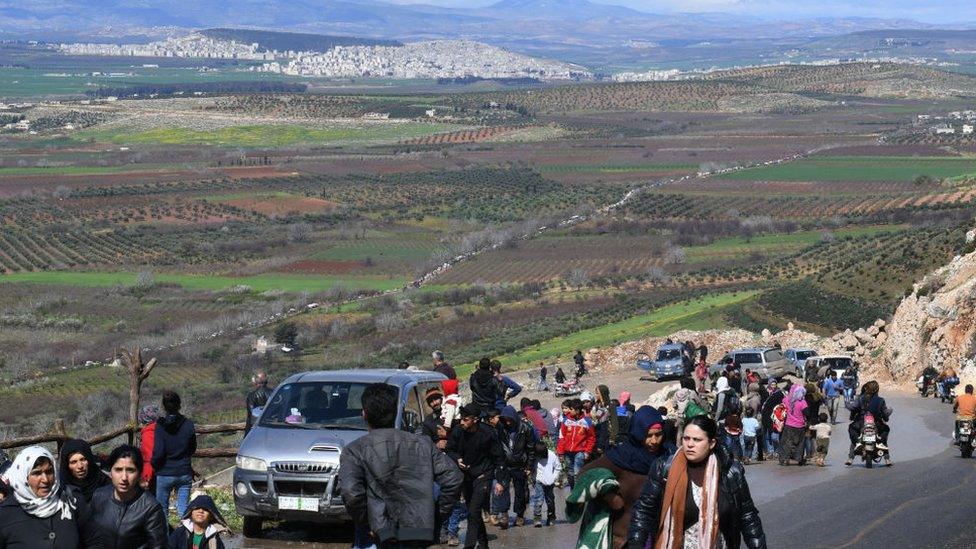
Civilians have fled Afrin in the past few days

Will Turkey press on?
By Mark Lowen, BBC Turkey Correspondent
President Erdogan has achieved his twin objectives: to remove a key area under YPG control and to rally the vast majority of Turks behind their commander-in-chief. The jingoism here has been breathtaking. Targeting the Kurdish militants, Turkey's age-old enemy, is a rare uniting force in a polarised country. Those who have spoken out - several hundred - have been detained for "terrorism propaganda".
The question now is whether Turkey pushes on to other YPG-held areas, namely Manbij, which could put Turkish troops in direct conflict with US soldiers there who see the YPG as allies. That depends on talks between Ankara and Washington, and the sacking of Secretary of State Rex Tillerson last week removes an important interlocutor for Turkey.
The risk in Afrin is that many residents who will return are Kurdish and could see Turkey as the aggressor. Tearing down a Kurdish statue in the town centre doesn't augur well. Will the Afrin operation actually push more local people into the arms of the YPG?

Why has Turkey taken Afrin?
The Turkish assault on Afrin, named Operation Olive Branch, began on 20 January, with the aim of ridding the city and surrounding region of the YPG.
Turkey regards the YPG as an extension of the banned Kurdistan Workers' Party (PKK), which has fought for Kurdish autonomy in south-eastern Turkey for three decades.
The YPG denies any direct organisational links to the PKK - an assertion backed by the US, which is allied with the YPG in the battle against the jihadist group Islamic State (IS) in Syria.
US plans to help form a Kurdish border force set alarm bells ringing in Ankara, and prompted the launch of Operation Olive Branch.
President Erdogan vowed to "suffocate" what he called a "terror army."
Turkey also announced plans to push Kurdish forces from Manbij, another city near the border.
What is the Free Syrian Army?
Backed by Turkey, the Free Syrian Army is a rebel group operating in the north of the country.
It is helping Turkey to secure its border with Syria, and has fought against the Syrian army, the Kurdish-led Syrian Democratic Forces and the Islamic State group.
What is happening elsewhere in Syria?
The assault in the north-west coincides with a Syrian and Russian offensive on Eastern Ghouta, an enclave near Damascus.
The Syrian army is pushing into the area with the support of Russian air strikes, and there are reports of civilian casualties.
The pro-government assault is said to have captured 80% of the enclave. Seizing it would be a major victory for President Bashar al-Assad, who reportedly visited Syrian troops in the Eastern Ghouta on Sunday.
State television broadcast images of the president in shirt and jacket surrounded by soldiers in an unspecified part of the district.
Allow X content?
This article contains content provided by X. We ask for your permission before anything is loaded, as they may be using cookies and other technologies. You may want to read X’s cookie policy, external and privacy policy, external before accepting. To view this content choose ‘accept and continue’.
- Published24 January 2018
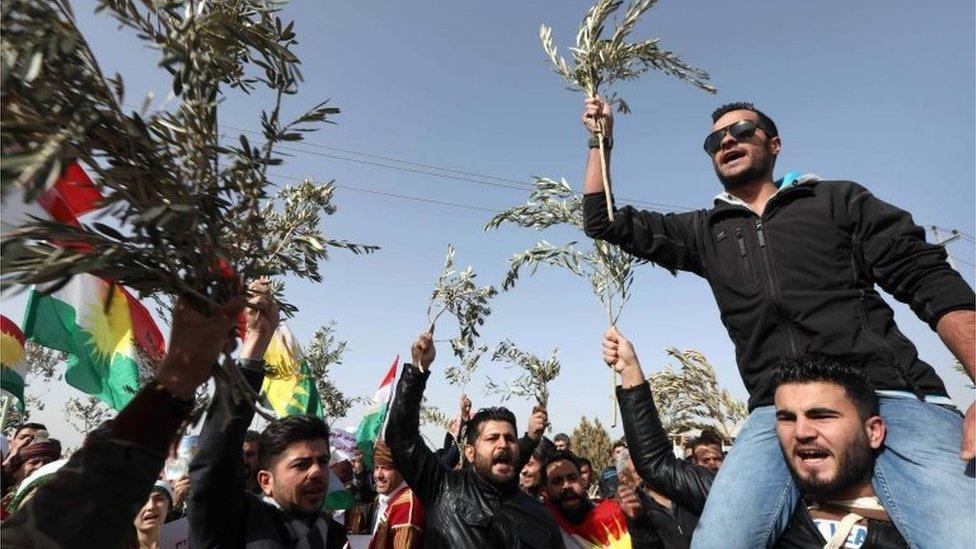
- Published2 February 2018
- Published22 January 2018
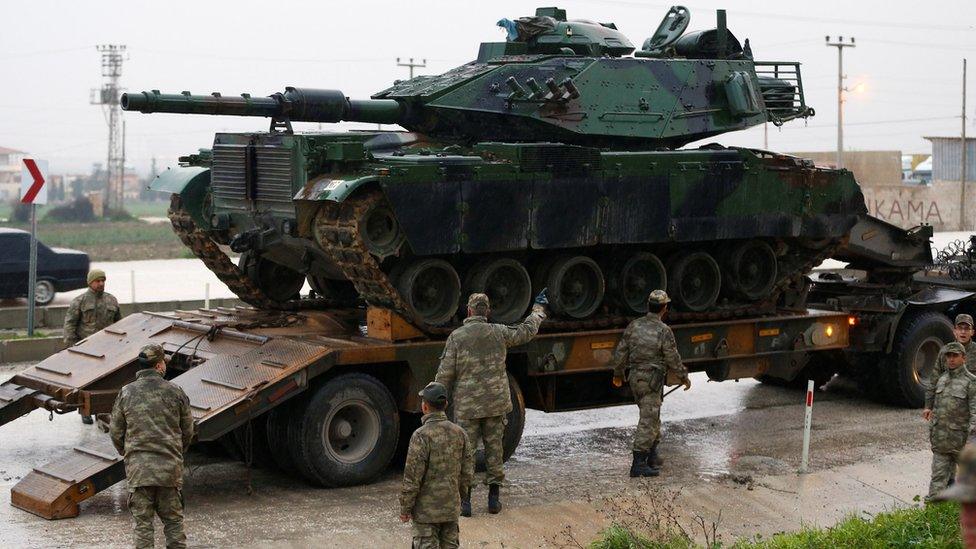
- Published15 October 2019
